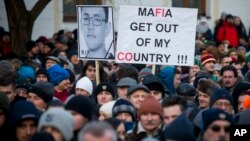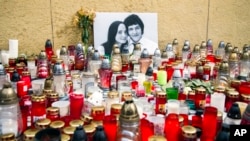Slovakia has quickly turned from what seemed to be a stable European Union country into chaos, in the wake of the unprecedented slayings of an investigative journalist and his fiancee.
In a speech last month, President Andrej Kiska talked about his country as “successful, proud and self-confident.” On March 4, however, he said Slovakia faces a “serious political crisis” triggered by the shooting deaths of Jan Kuciak and Martina Kusnirova. Police said Kuciak’s killing was likely linked to his work.
The political storm has been intensifying daily since their bodies were found Feb. 25.
Conspiracy theories
Amid heated exchanges between the ruling coalition and the opposition, conspiracy theories spread by Prime Minister Robert Fico and his repeated verbal attacks on Kiska, a growing number of people have started to turn against the Fico government, threatening its very existence.
For his last unfinished story, Kuciak, 27, reported on the influence of the Italian mafia in Slovakia and its possible ties to people close to Fico.
That was followed by news that Slovak authorities had been informed by their Italian counterparts about a powerful Italian crime syndicate operating in Slovakia. Seven members of the group are suspects in the killings. They were detained last week and later released.
Prevent another Hungary
When tens of thousands marched across the country and in cities around the world last week to honor Kuciak, many called on government ministers to resign. Massive demonstrations, this time aimed directly at the government, are planned for Friday.
“Many have realized that the situation is becoming critical,” said Michal Vasecka, an analyst from the Bratislava Policy Institute think tank. “A fight started to prevent Slovakia from becoming another Hungary, an autocracy controlled by a small group of oligarchs.”
Reflecting the popular mood and growing protests, Kiska called for substantial changes in the government or for an early election to resolve the crisis.
“There’s a huge public distrust of the state,” Kiska said. “And many don’t trust law enforcement authorities. ... This distrust is justified. We crossed the line, things went too far and there’s no way back.”
Fico fired back, accusing the president of destabilizing the country with help from Hungarian-American billionaire George Soros whom Kiska privately met with in New York in September.
Soros dismissed Fico’s suggestion he might have anything to do with the president’s proposals and the anti-government protests.
Shades of communist rule
Vasecka, the analyst, said Fico’s conspiracy claims likely anger some people and contribute to their decision to join the protests because they hark back to the 1990s and the rule of authoritative Prime Minister Vladimir Meciar who led the country into international isolation. Meciar also targeted Soros.
“It reminds people of Meciar and also of communist rule. And a large part of society is very sensitive about it,” Vasecka said.
U.S. Ambassador Adam Sterling said in a statement that “as Slovak society wrestles with the implications of this crime, we urge all parties to refrain from resorting to the use of conspiracy theories and disinformation.”
A junior party in the ruling coalition has called for the resignation of Interior Minister Robert Kalinak as a condition to remain in the government. Thousands already demanded Kalinak’s resignation last year after he was linked to earlier corruption scandals. The leadership of the coalition party known as Most-Hid will meet Tuesday to decide on their role in the coalition.
Meanwhile, the opposition has requested a parliamentary no-confidence vote on the government, but a date has yet to be set.
Fico called the opposition request an “attempted coup.”






